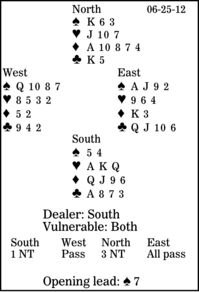Bridge column, June 25: Repetition can be good, be good

I sometimes worry about that, knowing I have covered some themes several times over the years. But usually I conclude that they are worth repeating because they are so important.
This week we will look at significant spot-card plays. How can the defenders defeat three no-trump after West leads the spade seven?
This auction ought to be automatic. Yes, here it works much better if South opens one diamond. North can make a three-diamond limit raise; South would rebid three hearts, showing a stopper in that suit and suggesting weakness in a black suit; and North would bid three no-trump, which is unbeatable. But if South opens one diamond and North responds one spade, South has no accurate rebid.
To defeat this contract, East must use the Rule of Eleven. Seven (the spot card led) from 11 is four. This means that North, East and South have four spades among them higher than the seven. And East can see all four. So, when declarer calls for dummy's three at trick one (there is no hurry to put up the king), East must play his two. In this way, West retains the lead. Another spade play allows the defenders to take the first four tricks. Later, the diamond king is the fifth defensive winner.
** ** **
COPYRIGHT: 2012, UNITED FEATURE SYNDICATE
DISTRIBUTED BY UNIVERSAL UCLICK FOR UFS

